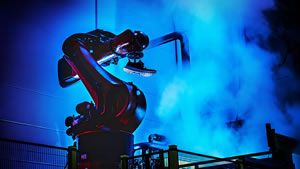Smart Manufacturing Takes Flight
Machine data now serves as the conversation starter on the floor to uncover issues and identify solutions. The third and final phase for AMT will be an upgrade to the gold licensing level of DataXchange and a roll out to all machines.
Industry 4.0 Needs Automated Power Sources
Decision-makers developing their Industry 4.0 strategies must consider how to ensure their facilities stay running during electricity disruptions. One possibility is to explore automated smart power sources.
The Challenges of Smart Manufacturing
Big data is transforming a variety of sectors, ushering them into the era of Industry 4.0. However, having access to raw data and knowing what to do with it are at completely different ends of the digitalization spectrum.
Readers Choice 2020: Quality 4.0: The 3 Most Important Technologies for Manufacturers
This article will explain the three technologies, that, based on Boston Consulting Group's Quality 4.0 study - will be deployed by most manufacturers who are planning to improve their quality management.
Reshoring America's Manufacturing Through Smart Manufacturing
Reshoring holds great potential for companies to gain increased flexibility and responsiveness when facing supply chain disruption. During COVID-19, we saw companies forced to fly to China to pick up specific parts.
The Journey Towards Autonomous Manufacturing
Within the industrial world, leaders are defining their journey to autonomous manufacturing. Manufacturers are focusing on digitization strategies that will help to drive efficiency across their plants.
MODEX Q&A - Emulate3D
This year at MODEX we'll be highlighting CAD Is The Model technology, which enables system designers to mark up their solutions in SOLIDWORKS and Autodesk Inventor and create articulated and dynamic systems for emulation testing.
Booth #7869
The long(er) way to networked smart lifts
The analysis of the operating conditions improves maintenance and allows more precise predictions to be made on usage behaviour, wear and tear, and malfunctions using "big data" approaches - the availability of lift systems is thus optimized.
How to Dodge the Industry-Wide Knowledge Gap
As the baby boomers born in the 1940s and 1950s start to retire, this means that the manufacturing, lumber, distribution, and retail sectors look set to suffer from a lack of sufficiently-skilled staff in the next 20-30 years.
The Importance of Service Assurance in Smart Manufacturing
Digital transformation is key to the success of many manufacturing businesses in todays environment, and service assurance is key to achieving that transformation.
The Enterprise Factory And The Smart City
Adi Gaskell for Forbes: Such a network ensures you not only have the technological skills required but also the cultural and softer factors that are so important.
Samsung announces R&D partnership with Clemson, USC to promote advanced manufacturing
Andrew Moore for Upstate Business Journal: The new partnership includes a program that aims to develop better manufacturing techniques for home appliances, foster public-private collaboration, and encourage more students to pursue advanced manufacturing as a career.
Adidas is using robots to produce small-batch, local-market shoes
Greg Nichols for ZDNet: It's an early step in a bold experiment by a global retailer to use time-saving robots to design small-batch collections, a departure from the mass production methods employed by global shoe and apparel brands.
AFRL researchers explore automation, additive technologies for cost efficient solar power
Phys.org: Solar cells can generate electricity in an environmentally friendly way, but current, complex fabrication costs make the technology expensive.
Accenture Launches Industrial IoT Innovation Center
Clients work with Accenture to design and prototype digital solutions that improve engineering, manufacturing, production and deliver new customer experiences
Records 1 to 15 of 22
Featured Product

Rapid Prototyping with the Modular Motor Series
Quick to configure. Quick to build. Quick to deliver. Parvalux understands the importance of getting product in the hands of customers quickly and efficiently. The Modular Range does just that allowing customers to configure their own solution, selecting motor and gearbox, adding encoders and brakes to create a solution perfectly suited for their specific applications such as conveyor belt systems, picking systems, parcel sorting equipment, pallet shuttles and automated storage and retrieval systems (ASRS). Read our modular range guide for specifics.
Manufacturing and Automation - Featured Company

The Wire Association International, Inc. (WAI)
The Wire Association International (WAI), Inc., founded in 1930, is a worldwide technical society for wire and cable industry professionals. Based in Madison, Connecticut, USA, WAI collects and shares technical, manufacturing, and general business information to the ferrous, nonferrous, electrical, fiber optic, and fastener segments of the wire and cable industry.
WAI hosts trade expositions, technical conferences, and educational programs.


.jpg)












